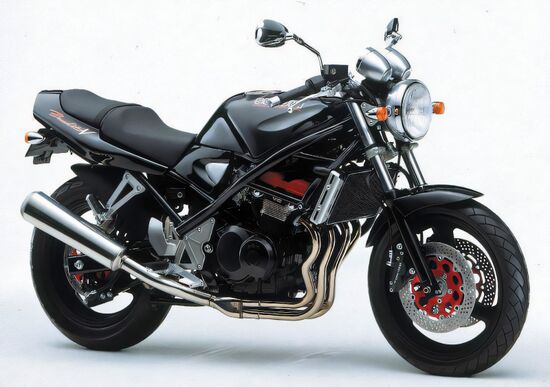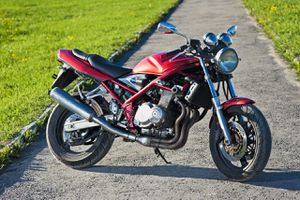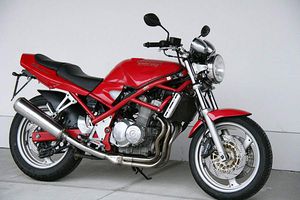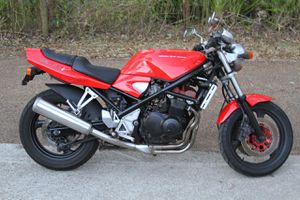Difference between revisions of "Suzuki GSF400 Bandit"
m |
m |
||
| Line 1: | Line 1: | ||
| − | {{DISPLAYTITLE:Suzuki GSF 400 Bandit | + | {{DISPLAYTITLE: Suzuki GSF 400 Bandit}} |
| − | |||
| − | |||
| − | |||
| − | }} | ||
__notoc__ | __notoc__ | ||
| − | [[Image:Gsf400 mod2.jpg|550px|center|Suzuki GSF400 Bandit VC]] | + | [[Image: Gsf400 mod2.jpg | 550px | center | Suzuki GSF400 Bandit VC]] |
| − | + | The Suzuki GSF 400 Bandit appeared in 1989 and was initially only available in the domestic Japanese market. Since 1991, the model has been officially supplied to the countries of Europe and North America. In the Russian market, in the overwhelming majority of cases, there are domestic Japanese modifications. | |
{{Ads_top}} | {{Ads_top}} | ||
| − | + | The Suzuki Bandit 400 was based on an in-line 4-cylinder liquid-cooled engine with a volume of 398 cc, producing 59 hp. power and 38 Nm of torque. Since 1993, due to a change in Japanese legislation, the maximum engine power has been reduced to 53 hp. This motor was not developed independently, but migrated from the sports model [[Suzuki_GSX-R400 | Suzuki GSX-R400]]. | |
| − | + | In 1991, Suzuki GSF400 Bandit introduces a new engine modification with a variable valve control (VC - variable valve control). Due to the characteristic red color of the cylinder head cover, this modification was called "red-headed", and the usual modification with a simple engine without this system is called "gray-headed". Both modifications existed on the market in parallel for almost the entire period of the model's production. The "red-headed" modification also differs with red brake discs (inner side) and the presence of the letter "V" in the factory designation. This engine was also installed on a sports tourist - [[Suzuki_RF400 | Suzuki RF400]]. | |
| − | + | In 1995, the model undergoes a minor restyling, receiving an aluminum swingarm, suspension settings, a new seat and a retuned VC variable valve timing system. This generation is also distinguished by the frame number - '''GK7AA'''. The last generation had a frame with an index - '''GK75A'''. | |
| − | 1997 | + | 1997 was the last year of production for the Suzuki Bandit 400, although official sales of new motorcycles continued until 2000. |
| − | + | Currently, the model is very popular in Russia as one of the cheapest Japanese motorcycles for beginners. The motorcycle is also in large quantities at Japanese auctions. | |
| − | '' | + | '' The lineup of the Suzuki GSF Bandit series: '' |
| − | * [[Suzuki_GSF250_Bandit|Suzuki GSF250 Bandit]] | + | * [[Suzuki_GSF250_Bandit | Suzuki GSF250 Bandit]] |
* '''Suzuki GSF400 Bandit''' | * '''Suzuki GSF400 Bandit''' | ||
| − | * [[Suzuki_GSF600_Bandit|Suzuki GSF600 Bandit]] | + | * [[Suzuki_GSF600_Bandit | Suzuki GSF600 Bandit]] |
| − | * [[Suzuki_GSF650_Bandit|Suzuki GSF650 Bandit]] | + | * [[Suzuki_GSF650_Bandit | Suzuki GSF650 Bandit]] |
| − | * [[Suzuki_GSF750_Bandit|Suzuki GSF750 Bandit]] | + | * [[Suzuki_GSF750_Bandit | Suzuki GSF750 Bandit]] |
| − | * [[Suzuki_GSF1200_Bandit|Suzuki GSF1200 Bandit]] | + | * [[Suzuki_GSF1200_Bandit | Suzuki GSF1200 Bandit]] |
| − | * [[Suzuki_GSF1250_Bandit|Suzuki GSF1250 Bandit]] | + | * [[Suzuki_GSF1250_Bandit | Suzuki GSF1250 Bandit]] |
| − | '' | + | '' The main competitors of the Suzuki GSF400 Bandit in the class: '' |
| − | * [[Honda_CB400|Honda CB400 SF]] / [[Honda_CB-1|Honda CB-1]] | + | * [[Honda_CB400 | Honda CB400 SF]] / [[Honda_CB-1 | Honda CB-1]] |
| − | * [[Yamaha_XJR400|Yamaha XJR400]] | + | * [[Yamaha_XJR400 | Yamaha XJR400]] |
| − | * [[Kawasaki_ZRX400|Kawasaki ZRX 400]] | + | * [[Kawasaki_ZRX400 | Kawasaki ZRX 400]] |
| − | == | + | == Photos == |
| − | {| align="center" border="0" | + | {| align = "center" border = "0" |
| − | |[[Image:C2e5f2cee1eb6aa0c9690108d19508ff.jpg|300px|thumb|Suzuki GSF400 Bandit]] | + | | [[Image: C2e5f2cee1eb6aa0c9690108d19508ff.jpg | 300px | thumb | Suzuki GSF400 Bandit]] |
| − | |[[Image:Suzuki gsf400 94 02.jpg|300px|thumb|Suzuki GSF400 Bandit]] | + | | [[Image: Suzuki gsf400 94 02.jpg | 300px | thumb | Suzuki GSF400 Bandit]] |
| − | |[[Image:Suzuki-gsf-400-bandit-7.jpg|300px|thumb|Suzuki GSF400 Bandit V (VC-engine)]] | + | | [[Image: Suzuki-gsf-400-bandit-7.jpg | 300px | thumb | Suzuki GSF400 Bandit V (VC-engine)]] |
|- | |- | ||
|} | |} | ||
| Line 42: | Line 38: | ||
{{Ads_post}} | {{Ads_post}} | ||
| − | == | + | == Specifications == |
| − | + | Specifications Suzuki GSF 400 Bandit: | |
| − | {| class="wikitable" | + | {| class = "wikitable" |
| − | ! scope="row"| | + | ! scope = "row" | Model |
| − | |Suzuki GSF400 Bandit | + | | Suzuki GSF400 Bandit |
|- | |- | ||
| − | ! scope="row"| | + | ! scope = "row" | Motorcycle type |
| − | | | + | | road (street, classic) |
|- | |- | ||
| − | ! scope="row"| | + | ! scope = "row" | Release year |
| − | |1989-1997 | + | | 1989-1997 |
|- | |- | ||
| − | ! scope="row"| | + | ! scope = "row" | Frame |
| − | | | + | | steel tubular |
|- | |- | ||
| − | ! scope="row"| | + | ! scope = "row" | Engine type |
| − | |4- | + | | 4-cylinder, 4-stroke, in-line |
|- | |- | ||
| − | ! scope="row"| | + | ! scope = "row" | Working volume |
| − | |398 | + | | 398 cm³ |
|- | |- | ||
| − | ! scope="row"| | + | ! scope = "row" | Bore / stroke |
| − | |56 | + | | 56.0 x 40.4 mm |
|- | |- | ||
| − | ! scope="row"| | + | ! scope = "row" | Compression ratio |
| − | |11.8:1 | + | | 11.8: 1 |
|- | |- | ||
| − | ! scope="row"| | + | ! scope = "row" | Cooling |
| − | | | + | | liquid |
|- | |- | ||
| − | ! scope="row"| | + | ! scope = "row" | Number of valves per cylinder |
| − | |DOHC, 4 | + | | DOHC, 4 valves per cylinder |
| − | GSF400V | + | GSF400V - VC engine (with variable timing system) |
|- | |- | ||
| − | ! scope="row"| | + | ! scope = "row" | Fuel supply system |
| − | | | + | | Carburetor, 4x Mikuni BST33SS |
| − | + | Carburetor, 4x Mikuni BST32SS - GSF400 (USA) | |
|- | |- | ||
| − | ! scope="row"| | + | ! scope = "row" | Ignition type |
| − | | | + | | transistor |
|- | |- | ||
| − | ! scope="row"| | + | ! scope = "row" | Maximum power |
| − | |59 | + | | 59.0 h.p. (43.4 kW) @ 12,000 rpm - GSF400 (1989-1992) |
| − | 53 | + | 53.0 h.p. (39.0 kW) at 11000 rpm - GSF400 (1993-1997) |
|- | |- | ||
| − | ! scope="row"| | + | ! scope = "row" | Maximum torque |
| − | |38 | + | | 38.0 Nm (3.9 kg * m) @ 10,500 rpm - GSF400 (1989-1992) |
| − | 37 | + | 37.0 Nm (3.8 kg * m) @ 9500 rpm - GSF400 (1993-1997) |
|- | |- | ||
| − | ! scope="row"| | + | ! scope = "row" | Gearbox |
| − | |6- | + | | 6-speed |
|- | |- | ||
| − | ! scope="row"| | + | ! scope = "row" | Drive type |
| − | | | + | | chain |
|- | |- | ||
| − | ! scope="row"| | + | ! scope = "row" | Front tire size |
| − | |110/70R-17M/C 54H | + | | 110 / 70R-17M / C 54H |
|- | |- | ||
| − | ! scope="row"| | + | ! scope = "row" | Rear tire size |
| − | |150/ | + | | 150 / 70-17M / C 69H - GK75A |
| − | 150/60R-17M/C 66H | + | 150 / 60R-17M / C 66H - GK7AA |
|- | |- | ||
| − | ! scope="row"| | + | ! scope = "row" | Front brakes |
| − | |2 | + | | 2 discs, 310 mm, 4-piston calipers |
| − | 1 | + | 1 disc - GSF400 (North America, Italy) |
|- | |- | ||
| − | ! scope="row"| | + | ! scope = "row" | Rear brakes |
| − | |1 | + | | 1 disc, 260 mm, 2-piston caliper |
|- | |- | ||
| − | ! scope="row"| | + | ! scope = "row" | Front suspension |
| − | | | + | | 41mm Telescopic Fork (Fixed), 120mm Travel - GK75A |
| − | + | 41mm Telescopic Fork (Fixed), 130mm Travel - GK7AA | |
|- | |- | ||
| − | ! scope="row"| | + | ! scope = "row" | Rear suspension |
| − | | | + | | steel swingarm with monoshock (7-stage preload adjustment), stroke - 120 mm - GK75A |
| − | + | aluminum swingarm with monoshock (7-stage preload adjustment), stroke - 128 mm - GK7AA | |
|- | |- | ||
| − | ! scope="row"| | + | ! scope = "row" | Motorcycle length |
| − | |2090 | + | | 2090 mm - GK75A |
| − | 2050 | + | 2050 mm - GK7AA |
|- | |- | ||
| − | ! scope="row"| | + | ! scope = "row" | Motorcycle width |
| − | |745 | + | | 745 mm - GK75A |
| − | 730 | + | 730 mm - GK7AA |
|- | |- | ||
| − | ! scope="row"| | + | ! scope = "row" | Motorcycle height |
| − | |1060 | + | | 1060 mm - GK75A |
| − | 1055 | + | 1055 mm - GK7AA |
|- | |- | ||
| − | ! scope="row"| | + | ! scope = "row" | Wheelbase |
| − | |1430 | + | | 1430 mm - GK75A |
| − | 1410 | + | 1410 mm - GK7AA |
|- | |- | ||
| − | ! scope="row"| | + | ! scope = "row" | Saddle height |
| − | |790 | + | | 790 mm - GSF400 (export versions) |
| − | + | 745mm - GSF400 (Japanese versions) | |
|- | |- | ||
| − | ! scope="row"| | + | ! scope = "row" | Minimum ground clearance |
| − | |155 | + | | 155 mm - GK75A |
| − | 140 | + | 140 mm - GK7AA |
|- | |- | ||
| − | ! scope="row"| | + | ! scope = "row" | Acceleration to 100 km / h |
| − | |5 | + | | 5.0 sec |
|- | |- | ||
| − | ! scope="row"| | + | ! scope = "row" | Maximum speed |
| − | |180 | + | | 180 km / h |
|- | |- | ||
| − | ! scope="row"| | + | ! scope = "row" | Fuel tank capacity |
| − | |16 | + | | 16.0 L - GK75A |
| − | 15 | + | 15.0 L - GK7AA |
| − | 14 | + | 14.5 L - GSF400 (California) |
|- | |- | ||
| − | ! scope="row"| | + | ! scope = "row" | Motorcycle weight (dry) |
| − | |167 | + | | 167 kg |
|- | |- | ||
| − | ! scope="row"| | + | ! scope = "row" | Motorcycle weight (curb) |
| − | |188 | + | | 188 kg |
|- | |- | ||
|} | |} | ||
| − | == | + | == Documentation == |
| − | + | [[Category:Motorcycles]] | |
| − | + | * [[Suzuki_GSF400_Bandit:_manuals|Suzuki GSF400]] | |
| − | |||
| − | |||
| − | |||
| − | |||
| − | * [[Suzuki_GSF400_Bandit:_manuals|Suzuki GSF400 | ||
== == | == == | ||
{{Ads_recomended}} | {{Ads_recomended}} | ||
Revision as of 17:20, 14 August 2021
The Suzuki GSF 400 Bandit appeared in 1989 and was initially only available in the domestic Japanese market. Since 1991, the model has been officially supplied to the countries of Europe and North America. In the Russian market, in the overwhelming majority of cases, there are domestic Japanese modifications.
The Suzuki Bandit 400 was based on an in-line 4-cylinder liquid-cooled engine with a volume of 398 cc, producing 59 hp. power and 38 Nm of torque. Since 1993, due to a change in Japanese legislation, the maximum engine power has been reduced to 53 hp. This motor was not developed independently, but migrated from the sports model Suzuki GSX-R400.
In 1991, Suzuki GSF400 Bandit introduces a new engine modification with a variable valve control (VC - variable valve control). Due to the characteristic red color of the cylinder head cover, this modification was called "red-headed", and the usual modification with a simple engine without this system is called "gray-headed". Both modifications existed on the market in parallel for almost the entire period of the model's production. The "red-headed" modification also differs with red brake discs (inner side) and the presence of the letter "V" in the factory designation. This engine was also installed on a sports tourist - Suzuki RF400.
In 1995, the model undergoes a minor restyling, receiving an aluminum swingarm, suspension settings, a new seat and a retuned VC variable valve timing system. This generation is also distinguished by the frame number - GK7AA. The last generation had a frame with an index - GK75A.
1997 was the last year of production for the Suzuki Bandit 400, although official sales of new motorcycles continued until 2000.
Currently, the model is very popular in Russia as one of the cheapest Japanese motorcycles for beginners. The motorcycle is also in large quantities at Japanese auctions.
The lineup of the Suzuki GSF Bandit series:
- Suzuki GSF250 Bandit
- Suzuki GSF400 Bandit
- Suzuki GSF600 Bandit
- Suzuki GSF650 Bandit
- Suzuki GSF750 Bandit
- Suzuki GSF1200 Bandit
- Suzuki GSF1250 Bandit
The main competitors of the Suzuki GSF400 Bandit in the class:
Photos
Specifications
Specifications Suzuki GSF 400 Bandit:
| Model | Suzuki GSF400 Bandit |
|---|---|
| Motorcycle type | road (street, classic) |
| Release year | 1989-1997 |
| Frame | steel tubular |
| Engine type | 4-cylinder, 4-stroke, in-line |
| Working volume | 398 cm³ |
| Bore / stroke | 56.0 x 40.4 mm |
| Compression ratio | 11.8: 1 |
| Cooling | liquid |
| Number of valves per cylinder | DOHC, 4 valves per cylinder
GSF400V - VC engine (with variable timing system) |
| Fuel supply system | Carburetor, 4x Mikuni BST33SS
Carburetor, 4x Mikuni BST32SS - GSF400 (USA) |
| Ignition type | transistor |
| Maximum power | 59.0 h.p. (43.4 kW) @ 12,000 rpm - GSF400 (1989-1992)
53.0 h.p. (39.0 kW) at 11000 rpm - GSF400 (1993-1997) |
| Maximum torque | 38.0 Nm (3.9 kg * m) @ 10,500 rpm - GSF400 (1989-1992)
37.0 Nm (3.8 kg * m) @ 9500 rpm - GSF400 (1993-1997) |
| Gearbox | 6-speed |
| Drive type | chain |
| Front tire size | 110 / 70R-17M / C 54H |
| Rear tire size | 150 / 70-17M / C 69H - GK75A
150 / 60R-17M / C 66H - GK7AA |
| Front brakes | 2 discs, 310 mm, 4-piston calipers
1 disc - GSF400 (North America, Italy) |
| Rear brakes | 1 disc, 260 mm, 2-piston caliper |
| Front suspension | 41mm Telescopic Fork (Fixed), 120mm Travel - GK75A
41mm Telescopic Fork (Fixed), 130mm Travel - GK7AA |
| Rear suspension | steel swingarm with monoshock (7-stage preload adjustment), stroke - 120 mm - GK75A
aluminum swingarm with monoshock (7-stage preload adjustment), stroke - 128 mm - GK7AA |
| Motorcycle length | 2090 mm - GK75A
2050 mm - GK7AA |
| Motorcycle width | 745 mm - GK75A
730 mm - GK7AA |
| Motorcycle height | 1060 mm - GK75A
1055 mm - GK7AA |
| Wheelbase | 1430 mm - GK75A
1410 mm - GK7AA |
| Saddle height | 790 mm - GSF400 (export versions)
745mm - GSF400 (Japanese versions) |
| Minimum ground clearance | 155 mm - GK75A
140 mm - GK7AA |
| Acceleration to 100 km / h | 5.0 sec |
| Maximum speed | 180 km / h |
| Fuel tank capacity | 16.0 L - GK75A
15.0 L - GK7AA 14.5 L - GSF400 (California) |
| Motorcycle weight (dry) | 167 kg |
| Motorcycle weight (curb) | 188 kg |
Documentation



